Factors affecting health literacy in hypertensive elder adults: an integrative review
Keywords:
influencing factors, hypertension, health literacy, elderlyAbstract
Health literacy is defined as individuals’ ability to access, understand, and assess health related information to make health related decisions. Health literacy in hypertension can be considered closely related to health outcome of hypertensive elder adults. Low health literacy negatively impacts people’s health according to numerous studies. The purpose of this integrative review is to examine which factors mostly influence health literacy in hypertensive elder adults. Literature review based on integrative review was utilized in order to provide comprehensive view and understanding of the phenomenon. This review extracted from three electronic databases (CINHAL, ScienceDirect and Google Scholar) between 1998 to 2020. Findings demonstrated that the factors that influence health literacy in hypertensive elder adult are age, gender, education levels, and knowledge of hypertension.
Nurses should promote the hypertensive elderly adults to increase health literacy by providing the following: 1) access to hypertension-related information and services, 2) knowledge and understanding of hypertension disease, 3) communication skills of hypertension health, 4) decision-making skills of hypertension lifestyle modification and behavior 5) Self-management skills of hypertension disease.
References
2. McNaughton CD, Jacobson TA, Kripalani S. Low literacy is associated with uncontrolled blood pressure in primary care patients with hypertension and heart disease. Patient Educ Couns. 2014;96 (2):165-70. doi:10.1016/j.pec. 2014.05.007
3. Pandit AU, Tang JW, Bailey SC, Davis TC, Bocchini MV, Persell SD, Federman AD, Wolf MS. Education, literacy, and health: mediating effects on hypertension knowledge and control. Patient Educ Couns. 2009;75(3):381-385 .doi :10.1016/j.pec. 2009.04.006
4. Khatib R, Schwalm JD, Yusuf S, et al. Patient and healthcare provider barriers to hypertension awareness, treatment and follow up: a systematic review and meta-analysis of qualitative and quantitative studies. PLoS One. 2014;9(1):e84238.
5. Whittemore R, Knafl K. The integrative review: updated methodology. J. Adv Nurs. 2005; 52(5) :546-553. doi:10.1111/j.1365-2648.2005. 03621. x
6. Beck CT. Facilitating the work of a meta-analyst. Res Nurs Health. 1999 Dec;22(6):523-30. O'Mathúna DP. Evidence-based practice and reviews of therapeutic touch. J. Nurs Scholarsh. 2000 Sep;32(3):279-85.
7. O'Mathúna DP. Evidence-based practice and reviews of therapeutic touch. J. Nurs Scholarsh. 2000 Sep;32(3):279-85.
8. Cooper HM, Lindsay JJ. Research synthesis and meta-analysis. In National Conference on Research Synthesis: Social Science Informing Public Policy, Jun, 1994, Washington, DC, US 1998. Sage Publications, Inc.
9. Nutbeam D. Health literacy as a public health goal: a challenge for contemporary health education and communication strategies into the 21st century. Health Promot Int. 2000 Sep 1;15(3):259-67.
10. Nutbeam D. Defining and measuring health literacy: what can we learn from literacy studies? Int J Public Health. 2009;54(5):303-5. doi:10.1007/ s00038-009-0050-x
11. Ingram RR. Health literacy and adherence to antihypertensive regimens in African Americans ages 50 and older The University of North Carolina at Greensboro; ProQuest Diss & Theses Global. (366834009). 2010 [cited 2020 Jun 04]. (Order No. 3403691): 2-97 Available from https:// search.proquest.com/docview/ 366834 009?accountid=32112
12. Levinthal BR, Morrow DG, Tu W, Wu J, Murray MD. Cognition and health literacy in patients with hypertension. J. Gen Intern Med. 2008 Aug; 23(8): 1172–76.
13. Paasche-Orlow MK, Wolf MS. The causal pathways linking health literacy to health outcomes. Am J Health Behav. Sep-Oct 2007;31 Suppl 1:S19-26.doi: 10.5555/ajhb. 2007.31.supp.S19
14. Park JY, June KJ. Influencing factors on functional health literacy among the rural elderly. J Korean Acad Community Health Nurs. 2011 Mar;22(1): 75-85. Korean. Published online April 04, 2014. https://doi.org/10.12799/jkachn.2011. 22.1.75
15. Baker DW, Gazmararian JA, Sudano J, Patterson M. The association between age and health literacy among elderly persons. J Gerontol B-Psychol. 2000 Nov 1;55(6):S368- S74. S74. https://doi.org/ 10.1093/geronb/55.6.S368
16. Son YJ, Song EK. Impact of health literacy on disease-related knowledge and adherence to self-care in patients with hypertension. J Korean Acad Fundam Nurs. 2012;19 (1): 6
17. Darvishpour J, Omidi S, Farmanbar R. The relationship between health literacy and hypertension treatment control and follow-up. Caspian J Health Res. 2016 Sep 10;2(1):1-8.
18. Kim HJ, Moon K, Park TH, Park SY, Yoon SJ, Oh IH. Factors affecting treatment compliance in new hypertensive patients in Korea. Clin Exp Hypertens. 2016;38(8):701-9.
19. Akoko BM, Fon PN, Ngu RC, Ngu KB. Knowledge of hypertension and compliance with therapy among hypertensive patients in the Bamenda Health District of Cameroon: a cross-sectional study. Cardiol Ther. 2017;6(1):53-67. doi:10.1007/ s40119-016-0079-x
20. Osborn CY, Paasche-Orlow MK, Bailey SC, Wolf MS. The mechanisms linking health literacy to behavior and health status. Am J Health Behav. 2011;35(1):118-28.
21. Pongkiatchai R, Wongwiseskul S. Nutrition Literacy and the Elderly with Hypertension. Journal of Food Health & Bioenvironmental Science. 2018 Sep 1;11(3):49-55.
22. Li X, Ning N, Hao Y, Sun H, Gao L, Jiao M, Wu Q, Quan H. Health literacy in rural areas of China: hypertension knowledge survey. Int. J. Environ. Res. Public Health. 2013 Mar;10(3) :1125-38. Published 2013 Mar 18. doi:10.3390/ ijerph 10031125
23. Chai Y, Xu H, Wang W, Liu B, Yang D, Fan H, Song F, Lu Z. A survey of factors associated with the utilization of community health centers for managing hypertensive patients in Chengdu, China. PLoS One. 2011;6(7):e21718. doi:10. 1371/ journal.pone.0021718
24. Chotchai. T, Seedaket. S, Taearak. K, Panyasong. S and Buajun. A factors related to health literacy in prevention of hypertension among group at risk in Samran Sub-District,Muaeng District, Khon Kaen Province. The Southern College Network Journal of Nursing and Public Health. 2020; 7(1), 45-56 (in Thai).
25. Anchala R, Kannuri NK, Pant H, Khan H, Franco OH, Di Angelantonio E, Prabhakaran D. Hypertension in India: a systematic review and meta-analysis of prevalence, awareness, and control of hypertension. J Hypertens. 2014; 32(6):1170-77. doi:10.1097/HJH.000 0000000000146
Downloads
Published
How to Cite
Issue
Section
License
บทความนี้ยังไม่เคยตีพิมพ์หรืออยู่ในระหว่างส่งไปตีพิมพ์ในวารสารอื่น ๆ มาก่อน และกองบรรณาธิการขอสงวนสิทธิ์ในการตรวจทาน และแก้ไขต้นฉบับตามเกณฑ์ของวารสาร ในกรณีที่เรื่องของท่านได้ได้รับการตีพิมพ์ในวารสารฉบับนี้ถือว่าเป็น ลิขสิทธิ์ของวารสารพยาบาลโรคหัวใจและทรวงอก






